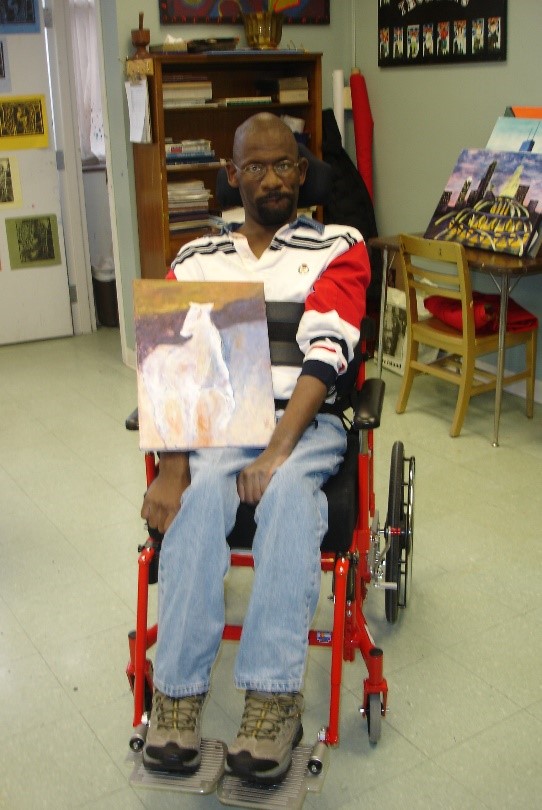
Derrick’s dynamic seating has reduced active muscle tone, improved his posture, and reduced equipment breakage.
Michelle L. Lange, OTR/L, ABDA, ATP/SMS
Derrick is a middle aged man who lives in a group home. His diagnoses include athetoid cerebral palsy and cognitive limitations. Derrick has fluctuating tone throughout his trunk and extremities and his extensor patterns dominate any attempt at volitional movement and communication. He is followed for his seating and mobility needs by Jill Sparacio, OTR, ATP/SMS. Click here to read his Case Study.
Equipment Breakage
Derrick has broken numerous wheelchair components from his repetitive tonal-driven movement. To help alleviate this, some dynamic components have been used in the past and his seating has been modified numerous times to help control this movement. Dynamic headrest hardware has been utilized to allow the headrest to extend with him. If his extension is met with rigid resistance, he leverages against this and extends with increased force. The dynamic headrest hardware was effective; however, did not reduce extension in his hips. This movement has been very destructive on his wheelchair frame, including numerous sheared side frames. A dynamic component at his hips was needed.
Of utmost importance was his need for a system that was durable and reliable. Funding for repairs is not always available. If Derrick’s system is broken, he misses outings from which he gains a great deal of enjoyment. While waiting for approval for a new wheelchair, his existing wheelchair completely fell apart and there was nothing to salvage. A new tilt in space wheelchair with a Seating Dynamics Rocker Back interface was recommended. As Derrick extends at his hips, this movement replaces solid resistance, diffusing his tone.
Posture
The Dynamic Rocker Back worked well with the new seating system and facilitated Derrick staying in alignment with the support surfaces. He has also experienced less wear and tear of the seating system with use of Dynamic Seating.
Results
Use of Dynamic Seating at the hips and neck has allowed Derrick to participate actively in community outings. Derrick is now able to participate in his vocational art program without issues related to his mobility. The use of the dynamic back component has provided him with increased tone management and has also resulted in less aggressive seating needs. Proper positioning is maintained, eliminating the need for frequent repositioning.
Per Jill, “Derrick is doing absolutely great in his system. He essentially has no problems. We go months without seeing him in wheelchair clinic as there are no repair needs yet. He actually will stop by just to say hi.”
More about Derrick: Case Study
** This post was originally published on https://www.seatingdynamics.com/2020/08/31/dynamic-stories-derrick/

